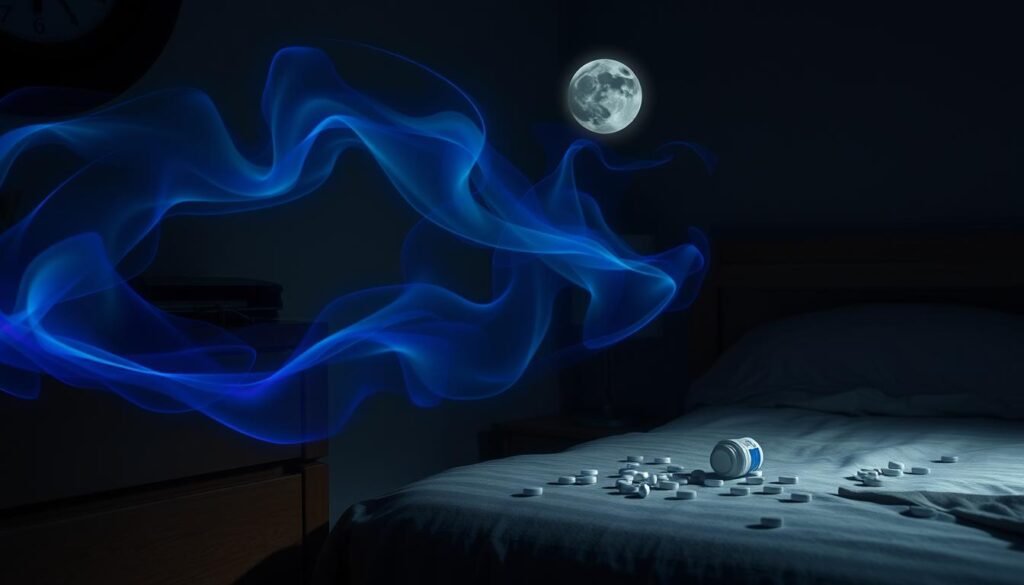About 9% of people taking Lexapro report insomnia as a side effect. This is almost twice the rate for those taking a placebo. It’s crucial for patients to understand and manage insomnia while on Lexapro. The drug, known as escitalopram, helps with depression and anxiety but may disrupt sleep.
Lexapro affects serotonin levels, which can mess with your sleep cycle. It’s important to find ways to handle insomnia while undergoing treatment. This piece will discuss how Lexapro and sleep issues are connected. It will also offer tips for keeping a healthy sleep routine with Lexapro. For more info, check this resource.
Key Takeaways
- Insomnia affects approximately 9% of Lexapro users.
- Monitoring sleep patterns can significantly help in managing insomnia from Lexapro.
- Timely consultation with a healthcare professional is essential if insomnia persists.
- A consistent sleep schedule can mitigate the effects of insomnia.
- Adjusting lifestyle factors like caffeine intake may reduce sleep disruptions.
Understanding Lexapro and Its Uses
Lexapro, or escitalopram, is part of a group called SSRIs. It’s mainly for major depressive disorder (MDD) and anxiety disorder (GAD). The FDA approved it in 2002 because it helps increase serotonin. This can make you feel better and less anxious.
Aside from treating depression and anxiety, Lexapro is also used for OCD, PTSD, panic, and social anxiety. It’s well-liked by doctors in the U.S. because it’s effective and generally well-tolerated.
Some people might have trouble sleeping while taking Lexapro. Up to 20% of users report insomnia. How much you take, your body’s response, and where you live can affect this.
Lexapro is a top choice in the U.S. for treating depression and anxiety disorders. It works well and has fewer harsh side effects. Adjustments by your doctor can help manage any sleep problems it might cause.
| Lexapro Uses | Conditions Treated | Common Side Effects |
|---|---|---|
| Major Depressive Disorder (MDD) | Obsessive-Compulsive Disorder (OCD) | Nausea |
| Generalized Anxiety Disorder (GAD) | Panic Disorder | Diarrhea |
| Post-Traumatic Stress Disorder (PTSD) | Fatigue | |
| Social Anxiety Disorder | Dizziness |
What is Insomnia from Lexapro?
Lexapro is a popular antidepressant that sometimes causes side effects, including insomnia. This kind of sleep trouble means you might have a hard time falling asleep, staying asleep, or you might wake up too early. About 1 in 5 people taking Lexapro face issues with their sleep, especially when they first start the treatment.
The link between Lexapro and sleep issues mainly lies in how it affects serotonin, which helps control our sleep. Those with major depression are 5% more likely to get insomnia with Lexapro than with a dummy pill. However, by treating depression and anxiety, Lexapro can eventually help improve sleep quality.
Often, the sleep problems caused by Lexapro don’t last long. Many see their sleep get better within a couple of weeks. But, some might experience sleep issues for up to four weeks. It’s tricky to tell if sleep problems are due to the medication or the condition being treated.
Common Lexapro Side Effects
Lexapro is a popular antidepressant that helps many people fight depression. However, it also comes with possible Lexapro side effects. Up to 20% of users might face antidepressant insomnia, having trouble falling or staying asleep.
But insomnia isn’t the only side effect. Other common complaints include feeling nauseous, dizzy, having a dry mouth, feeling tired, and experiencing sexual problems. Luckily, these side effects usually decrease as your body gets used to the medication.
Mostly, the sleep issues from Lexapro get better over time. How long you’ve been taking it, your body’s reaction, and the dose matter. For some teenagers and young people, Lexapro might make them feel more irritable or agitated, which shows the need for careful monitoring.
Lexapro affects serotonin levels which can disrupt sleep by changing other sleep-related brain chemicals. Knowing about these side effects is key. It helps you talk to your doctor about any sleep troubles or other issues while on Lexapro.
The Link Between Lexapro and Sleep Disturbances

The link between Lexapro and sleep troubles is strong. Lexapro is a certain kind of medication known as an SSRI. It often leads to antidepressant side effects, including insomnia for up to 20% of its users. This problem can start from changes in serotonin levels or an active nervous system when you first take it.
Insomnia from Lexapro can hit people differently. Some might struggle a lot with their sleep. Others might not have issues at all. But it’s important to know that these sleep problems usually get better as your body gets used to the drug.
Sleep problems can hit hard if you’re already battling anxiety or depression. Since poor sleep is common in these situations, handling lexapro and sleep issues is key to keeping your mental health on track. Things like a regular bedtime and a comfy sleep space can help with the sleep problems Lexapro might cause.
If sleep issues don’t get better with these steps, it might be time to look at your treatment again. Talking to your doctor can help figure out if you need a different dose or a new treatment plan. This is especially true if your sleep troubles are messing with your daily life.
It’s important to understand how Lexapro can affect your sleep. Knowing about the chance of insomnia and how to deal with it can make taking this medication much smoother for those using it to tackle depression or anxiety issues.
Managing Insomnia from Lexapro
For those dealing with Lexapro sleep issues, tackling insomnia is key. Effective strategies can greatly improve well-being. Trying out specific methods might ease the side effects of the medication.
Adjusting Medication Timing
Changing when you take Lexapro can help manage insomnia. Taking it in the morning might reduce issues at night, improving sleep. It’s important to talk to a healthcare provider for advice tailored to you.
Avoiding Alcohol and Caffeine
Alcohol and caffeine can mess with how well you sleep, making Lexapro-related insomnia worse. Cutting back or avoiding these can lead to better sleep. Knowing this is crucial for anyone with sleep troubles on Lexapro.
Establishing Healthy Sleep Hygiene
Good sleep habits can really help with falling and staying asleep. Keeping a regular sleep schedule, having a relaxing bedtime routine, and making your sleep space better can make a big difference. These steps are key for dealing with insomnia from Lexapro, helping you sleep more soundly.
Lexapro-Induced Insomnia: Duration and Expectations

Insomnia is often a side effect for new Lexapro users. The FDA notes about 5% might have sleep issues. These problems usually start in the first week. Yet, better sleep often comes within two to four weeks.
Most people find their sleep normalizes by week two to four. If sleep troubles last over four weeks, talking to a doctor is smart.
About 75% of people on antidepressants report side effects. Drowsiness and sweating are common early on. To help with sleep, try morning doses and less screen time at night.
Knowing about insomnia and side effects helps people cope. Talking with doctors can improve sleep during Lexapro treatment.
When to See a Doctor for Insomnia Issues
Dealing with insomnia while on Lexapro can be hard. It’s very important for those with big sleep problems to watch their symptoms carefully. If your insomnia is bad or lasts a long time, it can really affect your daily life. This is why knowing when to get help from a professional is key.
Recognizing Severe Symptoms
If you see these serious signs, you should think about talking to a doctor:
- Extreme fatigue that makes you feel tired all day
- Worsening depressive symptoms, like feeling sadder or not wanting to do anything
- Feelings of irritability or more worries than usual
Around 10% of people who take Lexapro might have insomnia. This trouble sleeping can be part of bigger sleep problems. If you can’t sleep well for a few weeks, it’s time to check with a doctor for advice.
Discussing Alternative Treatments
If Lexapro keeps causing sleep problems, your doctor might suggest some changes. They could talk about:
| Approach | Description |
|---|---|
| Dosage Adjustment | Changing how much you take to reduce side effects. |
| Medication Switch | Switching to another antidepressant that might not affect sleep as much. |
| Sleeping Aids | Using sleep medicines for a short time, watched by your doctor. |
Talking openly with your doctor about Lexapro and sleep problems is crucial. Sharing what you’re going through can help find the best way to handle your insomnia.
Exploring Other Potential Side Effects of Lexapro

Lexapro is a common treatment for anxiety and depression. It has several lexapro side effects users should know about. Up to 20% of people experience insomnia.
Other side effects include digestive issues, changes in mood, and physical symptoms. Users might feel nausea, get diarrhea, or have headaches. Emotional challenges like increased anxiety or mood swings can occur too.
Some individuals notice changes in weight and more sweating. Long-term effects of lexapro can vary, with sexual dysfunction being persistent for some. Erectile and ejaculatory dysfunction, along with a decrease in libido, may cause distress.
The review of side effects is critical to manage treatment better. While many side effects lessen over time, issues like prolonged erections can occur. It’s vital for patients to talk openly with their doctors about any adverse experiences.
| Side Effect | Occurrence | Duration |
|---|---|---|
| Insomnia | Up to 20% | Usually temporary |
| Nausea | Common (1 in 100) | May improve over time |
| Sexual Dysfunction | Common | May persist |
| Increased Sweating | Common | Varies |
| Weight Changes | Occasional | Varies |
Knowing about lexapro side effects helps users detect problems early on. This enables them to get the right help and adjustments in their treatment.
Support Strategies for Depression and Anxiety
Supporting depression and anxiety needs various methods. Taking medications like Lexapro can help. But, therapy, changing your lifestyle, and having a good support network also matter.
Therapy, like cognitive-behavioral therapy (CBT), works well with Lexapro to manage anxiety. It changes bad thought patterns into good ones. This change helps decrease anxiety and depression.
For those dealing with depression and anxiety, support groups are key. They are a place to share stories, make friends and get encouragement. This community helps people feel understood and supported, which is important for healing.
Changing how you live can make a big difference in mental health. Eating right and getting enough exercise are crucial. Exercise not only keeps you fit but also boosts your mood by releasing endorphins.
The table below shows different strategies for better mental health:
| Support Strategy | Description | Benefits |
|---|---|---|
| Psychotherapy | Therapeutic sessions focusing on cognitive behavioral strategies. | Develops coping mechanisms and promotes healthier thoughts. |
| Support Groups | Facilitated groups for individuals to share experiences. | Encouragement and shared understanding among peers. |
| Lifestyle Changes | Implementing nutritious diets and regular exercise. | Improves physical health and enhances mood through endorphin release. |
Adding these strategies to a treatment plan really helps. They boost the power of medications like Lexapro, or even holistic methods, in battling depression and anxiety.
Conclusion
It’s key to understand how Lexapro may cause insomnia for those managing their mental health. Studies show nearly 20% of Lexapro users might face sleep issues. It highlights why talking to healthcare providers is crucial.
Being informed lets people explore different ways to handle their symptoms better. This can lead to more effective symptom management.
Thankfully, sleep problems from Lexapro usually get better as the body adjusts. Adjusting when you take your medication can help. So can good sleep habits and avoiding caffeine and alcohol.
For tips on dealing with sleep issues, check out understanding the link between Lexapro. They have helpful advice for improving sleep during treatment.
Meeting your own sleep needs can greatly better your life quality. Knowing when you need more help and looking at all treatment options can offer relief. This goes for insomnia and other mental health issues too.